- Home
- Haruki Murakami
Men Without Women Page 2
Men Without Women Read online
Page 2
“Agreed.”
“Do you have any conditions?”
“Nothing in particular.” She narrowed her eyes as she carefully downshifted. “I like the car,” she added.
They drove the rest of the way without talking. When they arrived back at the garage, Kafuku called Oba over to give him the news. “I’ve decided to hire her,” he announced.
—
Misaki started working as Kafuku’s personal driver the next day. She would arrive at his Ebisu apartment building at half past three in the afternoon, take the yellow Saab from the underground garage, and drive him to a theater in Ginza. They drove with the top down unless it was raining. Kafuku practiced his lines on the way, reciting with the cassette recording. The play was a Meiji-era adaptation of Chekhov’s Uncle Vanya. He played the role of Uncle Vanya. He knew the lines by heart, but ran through them anyway to calm his nerves before a performance. This was his long-standing habit.
As a rule, they listened to Beethoven string quartets on the way home. Kafuku never tired of them—he found them perfectly suited to thinking or, if he preferred, thinking about nothing at all. If he wanted something lighter, he chose classic American rock. Groups like the Beach Boys, the Rascals, CCR, the Temptations, and so on. The popular music of his youth. Misaki never commented on his selection. He couldn’t tell if his music pleased or pained her, or if she was listening at all, for that matter. She was a young woman who didn’t show her emotions.
Under normal circumstances, Kafuku found reciting his lines in the presence of others stressful, but those inhibitions vanished with Misaki. In that sense, he appreciated her lack of expressiveness and her cool, distant personality. He might roar beside her while he rehearsed, but she acted as though she heard nothing. Indeed it was quite possible that her attention was solely focused on the road. Perhaps driving put her in a Zen-like frame of mind.
Kafuku had no idea what Misaki thought of him as a person. Was she kindly disposed, or unimpressed and disinterested, or did she loathe him and put up with him just to keep her job? He was in the dark. But it didn’t matter to him all that much how she felt. He liked her smooth and assured driving, her lack of chatter, and the way she kept her feelings to herself.
After the night’s performance ended, Kafuku washed off his stage makeup, changed his clothes, and left the theater as quickly as possible. He didn’t like dawdling. He knew almost none of his fellow actors. He would call Misaki on his cell phone and have her drive to the stage door to pick him up. When he stepped outside, the yellow Saab would be waiting for him. By the time he got back to his Ebisu apartment, it would be a little after ten thirty. This pattern repeated itself on a nightly basis.
He had other work as well. He spent one day a week shooting a drama series at a TV studio in the middle of the city. It was your garden-variety detective show, but the audience was large and it paid well. He played a fortune-teller who assisted the female lead detective. To prepare for the role, he had dressed in fortune-teller’s garb and set up a booth on the street, where he told the fortunes of a number of passersby. Word had it that many of his prognostications had hit the mark. When his day of shooting ended he went straight from the studio to the theater in Ginza. That was the risky part. On weekends, after the matinee, he would teach a night class at an acting school. He loved working with young actors. Misaki ferried him around for all these activities. She drove him from place to place without the slightest fuss, always on time, so that Kafuku grew used to sitting beside her in the Saab’s passenger seat. On occasion, he even fell fast asleep.
When the weather grew warmer, Misaki replaced her herringbone jacket with a lighter summer jacket. She always wore a jacket while working. Probably it was her equivalent of a chauffeur’s uniform. With the rainy season, the roof remained up more frequently.
Sitting there in the passenger seat, Kafuku often thought of his dead wife. For some reason, he recalled her more frequently now that Misaki was doing the driving. His wife had been an actor too, a stunning woman two years his junior. Kafuku was what was generally known as a character actor, hired to play supporting roles that were quirky in some way or other. He had a long and narrow face, and had begun to grow bald while he was still quite young. Not the leading-man type. His beautiful wife, on the other hand, was a real leading lady, and her roles and income reflected that status. As they got older, however, he became known as a skilled actor with a distinctive persona, while her star began to wane. But they both respected the other’s work, and so the shifts in their popularity and income never caused problems.
Kafuku adored his wife. He had fallen deeply in love with her when they first met (he was twenty-nine), and this feeling had remained unchanged until the day she died (he had been forty-nine then). He hadn’t slept with another woman in all their years of marriage. The urge had never arisen, although he had received his fair share of opportunities.
His wife, however, slept with other men on occasion. As far as he knew, there had been four such affairs. In other words, there were four men who had shared her bed for periods of time. She had never breathed a word to him, of course, but still it hadn’t taken him long to figure out that she was sleeping with some other man in some other place. Kafuku had a sixth sense about such things, and his love for her made it impossible for him to ignore the signs, however much he would have liked to. It was easy to tell who her lovers were from the way she talked about them. Invariably, they were fellow actors working on the same film. Most were younger. The relationship would continue for the few months they were shooting the movie and die a natural death when the filming stopped. The same thing had happened four times, always following the same pattern.
Kafuku hadn’t understood why she felt the need to sleep with other men. And he still didn’t. Their relationship as a married couple and as life partners had been excellent from the beginning. When time permitted, they talked with passion and honesty about a wide variety of subjects, and tried to trust one another. He had thought they were a most compatible pair, both spiritually and sexually. Others in their circle also regarded them as an ideal match.
He regretted that he had not summoned his resolve while she was still alive to question her about her affairs. It was a regret that visited him frequently. He had been oh-so-close to asking her. He would have said, What were you looking for in those other men? What did you find lacking in me? But it had been mere months before the end, and she was suffering terribly as she struggled against her approaching death. He didn’t have the heart to demand an answer. Then, without a word of explanation, she had vanished from Kafuku’s world. The question never ventured, the answer never proffered. He was lost in those thoughts at the crematorium as he plucked her bones from the ashes. So lost that when someone whispered in his ear, Kafuku did not hear him.
Needless to say, picturing his wife in the arms of another man was painful for Kafuku. It could be no other way. When he closed his eyes, the details of their lovemaking would rise unbidden and then fade away, only to rise again. He didn’t want to imagine such things, but he couldn’t help it. The images whittled away at him like a sharp knife, steady and unrelenting. There were times he thought it would have been far better to never have known. Yet he continued to return to his core principle: that, in every situation, knowledge was better than ignorance. However agonizing, it was necessary to confront the facts. Only through knowing could a person become strong.
The most excruciating thing, though, had been maintaining a normal life knowing his partner’s secret—the effort it required to keep her in the dark. Smiling calmly when his heart was torn and his insides were bleeding. Behaving as if everything was fine while the two of them took care of the daily chores, chatted, made love at night. This was not something that a normal person could pull off. But Kafuku was a professional actor. Shedding his self, his flesh and blood, in order to inhabit a role was his calling. And he embraced this one with all his might. A role performed without an audience.
Yet if you p
ut these things aside—excluded, in other words, the fact that she conducted occasional affairs with other men—their married life was calm and contented. Their careers proceeded smoothly, and they had no financial worries. Over the course of their nearly twenty years together, they made love countless times; for him, at least, the sex had been entirely satisfying. After she contracted uterine cancer and, in what seemed a mere instant later, passed away, he had been lucky enough to meet several women who, in the natural course of things, he had taken to bed. Yet he never experienced the same intimate joy with them that he had with his wife. All he felt was a mild sense of déjà vu, as if he were reenacting a scene from his past.
—
His management office needed specific information to process Misaki’s paychecks, so Kafuku had to ask her to provide her address, the location of her family register, her birth date, and her driver’s license number. She was living in an apartment in downtown Akabane, her family register was in Junitakicho on the island of Hokkaido, and she had just turned twenty-four. Kafuku had no idea where Junitakicho was in Hokkaido. But the fact that she was twenty-four grabbed his attention.
Kafuku’s wife had given birth to a baby who had lived only three days. It was a girl. She died on her third night in the hospital nursery. Her heart stopped without warning. When they found her the next morning, she was already cold. The hospital said that she had been born with a defective heart. There had been no way to verify their story. Nor would finding the true cause of death have restored her to life. For better or for worse, they had not yet given her a name. Had she lived, she would have been twenty-four years old. Kafuku always marked the birthday of this nameless child by joining his hands in prayer. Then he would think about how old she would have been.
As one would expect, the sudden death of their child wounded Kafuku and his wife, suspending them in a dark, heavy void. It took them a very long time to get back on their feet. They secluded themselves in their apartment, where for much of the time they lived in virtual silence. Words, they felt, could only cheapen the emotions they were feeling. She took to drinking immoderate amounts of wine. He, for a time, became a passionate, almost fanatical practitioner of calligraphy. It was as if he felt that the black symbols flowing from his brush onto the pure white paper could somehow lay bare the workings of his heart.
Nevertheless, by supporting each other, slowly but surely, the two of them recovered from their wounds enough to pass through that dangerous period. Their focus on work became even more intense. When they took on new roles, they immersed themselves totally, voraciously. She told him that she had no further desire for children, and he agreed. They would make sure she never got pregnant again. He was happy to do whatever she wanted.
Thinking back, he realized that it was at that time that her love affairs began. Perhaps the loss of their child had reawakened her sexual desire. But that was pure conjecture on his part. Nothing more than another “perhaps.”
—
“Can I ask you something?” Misaki said.
Kafuku had been looking out the window at the passing scenery, lost in thought. He turned to her in surprise. They had been driving around together for two months, and rarely had she initiated a conversation.
“Of course,” Kafuku said.
“Why did you become an actor?”
“A college friend of mine, a girl, asked me to join her theater club. I’d never been interested in acting. I wanted to play baseball. I’d been the starting shortstop on my high school team, and was pretty confident of my defensive ability. But I wasn’t quite good enough for our college team. So I figured, what the heck, I might as well take a stab at something new. I wanted to spend more time with that girl, too. After I’d been acting for a while, though, it dawned on me that I really liked it. Performing allowed me to be someone other than myself. And I could revert back when the performance ended. I really loved that.”
“You loved being someone other than yourself?”
“Yes, as long as I knew I could go back.”
“Did you ever not want to go back?”
Kafuku thought for a moment. No one had asked him that before. They were heading for the Takebashi exit on the Tokyo Metropolitan Expressway, and the road was jammed.
“There’s no other place to go back to, is there?” Kafuku said.
Misaki didn’t venture an opinion.
They were silent for a while. Kafuku removed his baseball cap, inspected its shape, and stuck it back on his head. Next to them was a tractor trailer with too many wheels to count, a huge rig that made their yellow Saab convertible feel transitory, ephemeral. Like a tiny sightseeing boat floating next to an oil tanker.
“This may be out of line,” Misaki said, “but it’s been on my mind. Is it okay if I ask?”
“Shoot,” Kafuku said.
“Why don’t you have any friends?”
Kafuku looked questioningly at Misaki’s profile. “How do you know I don’t have any?”
Misaki shrugged. “I’ve been driving you around for two months now, so I guess I can figure out that much.”
Kafuku studied the tractor trailer’s enormous tires for a long moment. “There haven’t been many people I could call true friends,” he finally said. “I wonder why.”
“Even when you were a child?”
“No, I had lots of pals back then. But once I grew up I no longer felt the need for them. Especially after I got married.”
“Having a wife meant you no longer needed friends?”
“I guess so. She and I were great pals too, after all.”
“How old were you when you got married?”
“Thirty. We were in the same movie. She had a major supporting role, and I had a bit part.”
The car inched its way forward through the traffic jam. The roof was closed, as it always was when they drove on the expressway.
“You don’t drink at all?” Kafuku changed the subject.
“My body can’t handle alcohol,” Misaki said. “And my mother was a problem drinker, which may have something to do with it.”
“Does her drinking still cause problems?”
Misaki shook her head from side to side. “My mother’s dead. She was driving drunk, lost control of the steering wheel, went into a spin, and flew off the road and into a tree. She died almost instantly. I was seventeen.”
“Poor woman,” Kafuku said.
“What goes around comes around,” Misaki said without emotion. “It was bound to happen sooner or later. The only question was when.”
They were silent for a while.
“And your father?”
“I don’t know where he is. He left home when I was eight and I haven’t seen him since. Haven’t heard from him, either. Mother always blamed me for his leaving.”
“Why?”
“I was their only child. If I’d been prettier, Father never would have left. That’s what Mother always said. It’s because I was born ugly that he abandoned us.”
“You’re not ugly,” Kafuku said quietly. “Your mother just preferred to think of it that way.”
Misaki gave a slight shrug. “Normally she wasn’t like that, but when she was drinking, she just went on and on. Repeated the same stuff over and over again. It hurt me. It’s bad, I know, but I was relieved when she died.”
This time the silence was even longer.
“Do you have friends?” Kafuku inquired.
Misaki shook her head. “Not a single one.”
“Why?”
She didn’t answer. With her eyes narrowed, she focused on the road.
Kafuku tried to take a nap, but sleep wouldn’t come. The car edged forward and stopped, edged forward and stopped, as Misaki deftly shifted gears. In the adjacent lane, the tractor trailer moved ahead and fell behind, like the shadow cast by some enormous fate.
Kafuku gave up trying to sleep. “The last time I became friends with someone was nearly ten years ago,” he said, opening his eyes. “Perhaps ‘someone like a frien
d’ would be more accurate. He was six or seven years younger than me, a heck of a nice guy. He liked to drink, so we drank and talked about all kinds of things.”
Misaki nodded and waited for him to continue. Kafuku hesitated for a moment before plunging in.
“To tell you the truth, he was one of my wife’s lovers. He didn’t know that I knew, though.”
It took Misaki a long moment to get her head around what she had just heard. “You mean he was having sex with your wife?” she said at last.
“That’s right. I think he was having sex with my wife on a regular basis for three or four months.”
“How did you know?”
“She hid it from me, of course, but I could tell. It would take too long to explain how. But there was no question. My imagination wasn’t playing tricks on me.”
When they stopped for a moment, Misaki reached up with both hands to adjust the rearview mirror. “Didn’t that get in the way of your friendship?”
“Quite the opposite,” Kafuku said. “I made him my friend precisely because he had slept with my wife.”
Misaki didn’t say anything. She waited for him to go on.
“How can I put this…I wanted to understand. Why she slept with him, why he was the one she wanted. At least that was my motive in the beginning.”
Misaki took a long, deep breath. Her chest rose beneath her jacket, then sank back. “But wasn’t that awfully painful? Drinking and talking with a man you knew had slept with your wife?”
“It wasn’t easy,” Kafuku said. “It made me think things I would prefer to have ignored. Remember things I would rather have forgotten. But I was acting. That is my profession, after all.”
“Becoming somebody different,” Misaki said.
“That’s right.”
“And then going back to who you are.”
“That’s right,” Kafuku said. “Whether you want to or not. But the place you return to is always slightly different from the place you left. That’s the rule. It can never be exactly the same.”

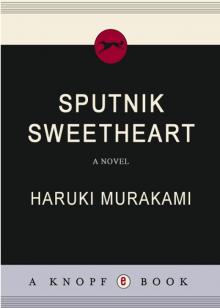 Sputnik Sweetheart
Sputnik Sweetheart Dance Dance Dance
Dance Dance Dance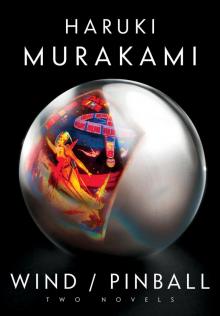 The Wind (1) and Up Bird Chronicle (2)
The Wind (1) and Up Bird Chronicle (2) Blind Willow, Sleeping Woman
Blind Willow, Sleeping Woman Absolutely on Music: Conversations With Seiji Ozawa
Absolutely on Music: Conversations With Seiji Ozawa Norwegian Wood
Norwegian Wood South of the Border, West of the Sun
South of the Border, West of the Sun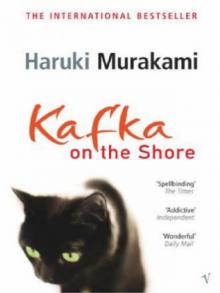 Kafka on the Shore
Kafka on the Shore Men Without Women
Men Without Women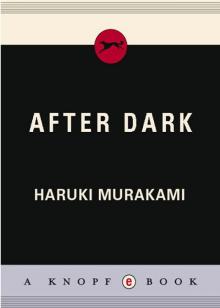 After Dark
After Dark Hard-Boiled Wonderland and the End of the World
Hard-Boiled Wonderland and the End of the World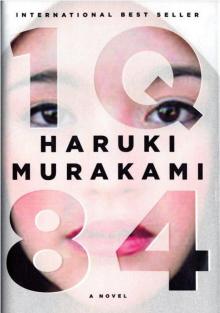 1q84
1q84 The Wind-Up Bird Chronicle
The Wind-Up Bird Chronicle Underground: The Tokyo Gas Attack and the Japanese Psyche
Underground: The Tokyo Gas Attack and the Japanese Psyche Vintage Murakami
Vintage Murakami The Elephant Vanishes: Stories
The Elephant Vanishes: Stories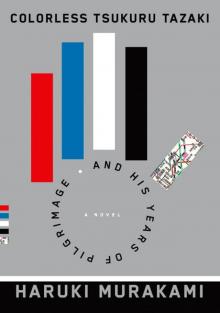 Colorless Tsukuru Tazaki and His Years of Pilgrimage
Colorless Tsukuru Tazaki and His Years of Pilgrimage First Person Singular
First Person Singular After the Quake
After the Quake A Wild Sheep Chase
A Wild Sheep Chase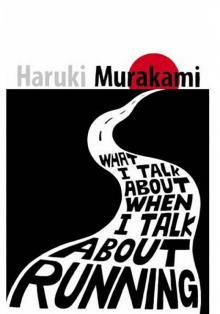 What I Talk About When I Talk About Running
What I Talk About When I Talk About Running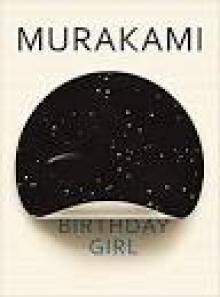 Birthday Girl
Birthday Girl The Elephant Vanishes
The Elephant Vanishes Norwegian Wood (Vintage International)
Norwegian Wood (Vintage International)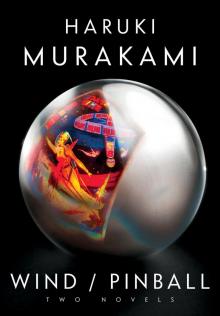 Wind/Pinball
Wind/Pinball Norwegian Wood Vol 1.
Norwegian Wood Vol 1. Underground
Underground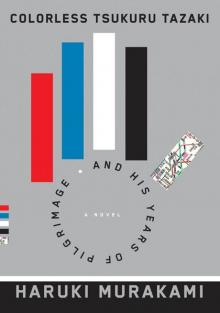 Colorless Tsukuru Tazaki and His Years of Pilgrimage: A novel
Colorless Tsukuru Tazaki and His Years of Pilgrimage: A novel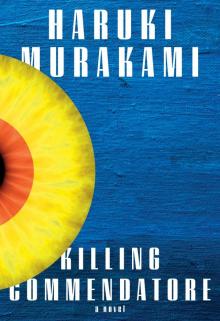 Killing Commendatore
Killing Commendatore Absolutely on Music
Absolutely on Music